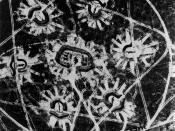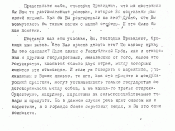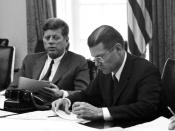With the conclusion of World War II emerged two victorious super powers, who had two completely different ideologies: the democratic U.S. and the communist Soviet Union. This inevitably began the era of icy tensions (Cold War) between the two countries where both countries constantly threatened and attempted to outdo the other. By 1952 when President Eisenhower took office, the U.S. comprised a strict foreign policy that strived to "contain" the spreading of communism and to take a firm stand against communist threats. With this policy the U.S. attempted to promote safety and freedom for democracy. However, as a result of this foreign policy came the danger of nuclear war as well. Perhaps the closest the U.S. came to starting a war with the Soviets was in the Cuban missile crisis of 1962, during the presidency of Kennedy. This paper will show how the stance Eisenhower and Kennedy took towards Communism strived for safety and freedom for America and democracy but at the same time escalated the danger for democracy as well.
The Eisenhower administration, under Secretary of State John Foster Dulles, sought to promote safety and freedom of democracy through the liberation of captive people under communism and through massive retaliation of communism. In reality, however the policy wasn't much of a change from Truman's containment policy since the U.S. mostly concentrated in stopping the spreading of communism throughout the world during this time. The Eisenhower administration aided the French in their efforts to defeat Ho Chi Minh and his communist associates in Indo-China. The U.S. also aided Taiwan when they were pressured by Communist China. In this sense the U.S. did seek to make it safe for countries around the world from becoming communist. However, this necessarily didn't mean that America and the world in general were safe from...


